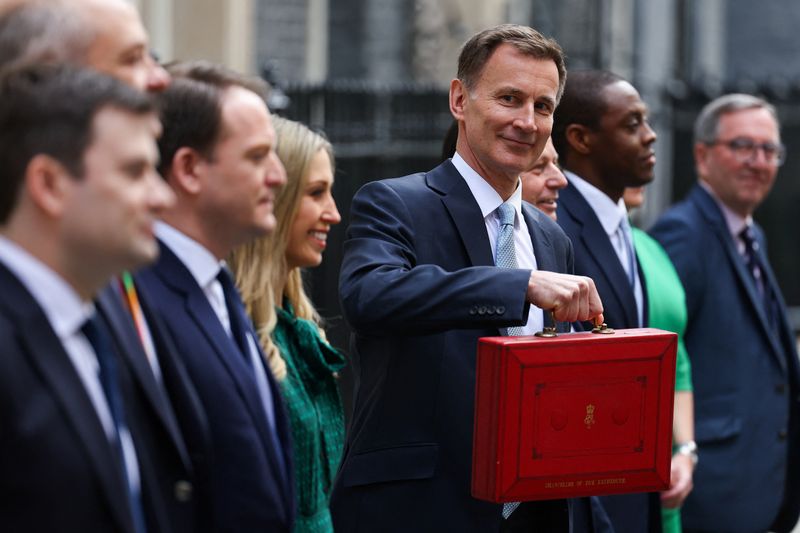LONDON (Reuters) - Britain's economy is forecast to grow by 0.8% this year after entering a recession in the second half of 2023, finance minister Jeremy Hunt said in a budget speech on Wednesday that delivered little in the way of surprises for markets.
In what was possibly his last fiscal statement before an election expected later this year, Hunt offered voters a raft of tax cuts, including to the rate of national insurance, in a bid to woo them back to Prime Minister Rishi Sunak's Conservatives. This slashed the emergency reserves in the public finances to the bone.
The pound showed little initial reaction, while stocks extended gains. UK bonds or gilts held fairly steady, given the government's borrowing plans for the coming financial year came in broadly in line with expectations, meaning no repeat of the fireworks that ensued after the interim budget released in September 2022 by then-finance minister Kwasi Kwarteng.
MARKET REACTION:
STOCKS: Britain's mid-cap FTSE 250 index edged higher, up 1.3% on the day, versus a gain of 0.8% prior to Hunt's speech.
FOREX: Sterling rose 0.1% to $1.2719, from $1.2722 earlier. The pound was mostly steady against the euro at 85.56 pence.
FIXED INCOME: Five-year gilt yields dipped 1 basis point on the day to 3.975%, versus 3.99% before Hunt's comments.
MONEY MARKETS: Futures markets continued to show a 90% chance the Bank of England could interest rates by August this year.
COMMENTS:
PAUL DALES, CHIEF UK ECONOMIST, CAPITAL ECONOMICS, LONDON:
"The net fiscal giveaway of 13.9 billion pounds (0.5% of GDP) in 2024/25 in the budget may, at the margin, help lift the economy out of its mild recession before an election later this year. But a big tightening in fiscal policy is still on the cards for after the election and that will probably require new tax hikes. The resulting drag on the economy may contribute to more interest rates cuts next year than most expect, to 3.00% from 5.25% now."
JANE FOLEY, HEAD (LON:HEAD) OF FX STRATEGY, RABOBANK, LONDON:
"By the time the budget statement was committed to the House, the pound had returned to levels largely in line with those held at the start. News that the OBR is forecasting inflation back at target in a few months did briefly weigh on the pound, given the implications for the BOE. However, aside from the pledge to maintain spending growth at a real 1% going forward (a drop to 0.75% had been mooted), there was little in the way of surprise big-ticket items."
LEE HARDMAN, SENIOR CURRENCY ANALYST, MUFG, LONDON:
"The market reaction has been fairly muted so far. Most of the main measures were already in the media over the weekend, there were no real surprises, and the government has played it relatively safe. From an economic perspective that limits the near term stimulus for the economy, so doesn’t really alter expectations for Bank of England policy.
"At the very margin, you could say it has taken a bigger stimulus off the table, and could mean the Bank of England could cut rates slightly sooner than what’s priced in. But that’s at the margin, the key for determining when the BoE cuts rates is going to be the data on inflation and growth, that’s far more important."
SARAH COLES, HEAD OF PERSONAL FINANCE HARGREAVES LANSDOWN, LONDON:
"National Insurance is only one part of a wider tax picture, with is growing gloomier. This April we’ll see another freeze in the personal allowance and the higher rate tax threshold, which the OBR says will see 1.1 million more people dragged into paying income tax and 800,000 more forced to pay higher rate tax."
KENNETH BROUX, SENIOR STRATEGIST FX AND RATES, SOCIETE GENERALE, LONDON:
"It was a snooze for the pound and gilts. All was priced in, and the 265-pound gilt issuance is not far off consensus. The government was more upbeat on growth than the Bank of England, but that was to be expected and I don’t think it moves the dial on rate cuts."
"In any case the budget won’t backfire on the pound, yields are steady, that's encouraging and symbolises confidence in public finances, unlike September 2022."
KIRSTINE KUNDBY-NIELSEN, FX ANALYST, DANSKE BANK, COPENHAGEN:
"It was pretty much in line with what we expected. You can see that from the market reaction with gilts and sterling both pretty steady.
"You have to take it with a grain of salt because there will probably be a new government by the end of the year."
COLIN ASHER, SENIOR ECONOMIST, MIZUHO BANK, LONDON:

"There was lots of low level sensible stuff in today's budget but nothing to really move the needle either economically or politically.
"Neither gilts nor sterling showed much reaction, which is unsurprising, given how heavily the bulk of the measures were trailed in advance."